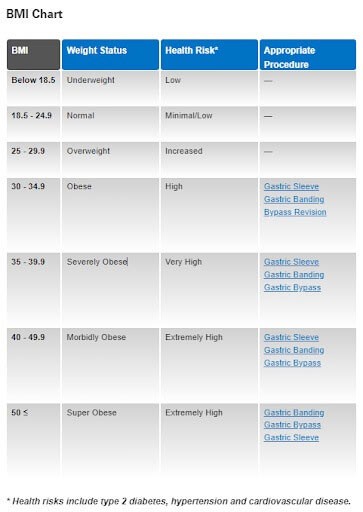It’s no secret that the world is getting heavier. A combination of gargantuan food portions, unhealthy food choices, and sedentary lifestyles have had detrimental effects on our weight and health.
A whopping two out of every five adults is either overweight or obese. And nearly half of all adults will be considered obese by 2030.
When diet and exercise fail to work, bariatric (weight loss) surgery can be a major blessing.
Imagine waking up week after week and finding that your clothes feel looser and looser.
Picture yourself looking in the mirror and finding a thinner face staring back at you.
Envision stepping on the scale and watching the numbers decrease every month.
Think about how you’ll feel when people come up to you and marvel at your narrower waist as they ask, “What helped you lose all the weight?”
This is what weight loss surgery can do for you. If you have tried everything to lose weight, the right bariatric procedure can help you finally achieve your weight loss goals.
Around 228,000 to 250,000 bariatric (weight loss) procedures are performed in the U.S. each year. 580,000 weight loss procedures are performed worldwide. These numbers represent a mere 1% of those who qualify.
Why do so few eligible adults undergo a type of surgery that aims to improve their health and extend their longevity?
For many, it’s a lack of knowledge.
Based on the questions people ask during the initial weight loss surgery consultation, too many people are misinformed about whether they qualify for weight loss surgery in the first place.
Some believe you have to be 400 pounds or over, like those people that need holes cut into the sides of their homes to be extracted by emergency personnel.
This simply is not true.
The qualifications of bariatric surgery are simple to understand. They have also recently changed.
If you wonder if you are a suitable candidate for bariatric surgery, you’ll want to stay tuned to this article.
By the end, you will be more informed about the qualification criteria. You’ll also gain insight into the methods bariatric surgeons use to decide a patient’s candidacy for the types of bariatric surgery currently available. Most importantly, you will be able to more accurately determine if you are a suitable candidate for the procedure of your choice.
If you don’t want to wait until the end of the article, and you want answers now, contact Healthy Life Bariatrics in Los Angeles, California. You can schedule a discreet consultation with renowned surgeon Doctor Babak Moeinolmolki by calling (310)881-8503.

The American Medical Association officially recognized obesity as a disease in the year 2013. Still, many people mistakenly view obesity as a malfunction of willpower. It may not be your fault that you have put on so much weight. Obesity can be influenced by genetics, environmental factors, physiological characteristics, behavioral tendencies, and sleep conditions.
Being obese can negatively influence your mental health. You may feel anxious, depressed, and downright frustrated that you have tried everything to lose weight, and still the scale will not budge.
Obesity is also hard on your health. The disease is associated with approximately 200 health conditions.
Bariatric surgery can help when all the diets and exercise programs in the world have failed to help.
Doctors use specific criteria to assess your candidacy for bariatric surgery. These include your body mass index (BMI), body composition, and an evaluation of present weight-related complications. Let us look at each of these in greater detail.
Body mass index is a figure doctors calculate to measure the relationship between your height and weight.
To calculate BMI yourself, multiply your weight in pounds by 703.
Next, divide the answer you get by your height in inches.
Divide that answer by your height in inches again to get your BMI score.
To give you an idea of what your BMI score means, here is a chart provided by UC San Diego Health.

You may qualify for a weight loss procedure if your body mass index is 40 or more. In this category, you are determined to be at least 100 pounds or more overweight for men and 80 pounds overweight for women.
You can also qualify for a procedure if your BMI is a bit lower. Doctors will consider you for surgery if your body mass index is 35 to 39.9 with a serious weight-related health issue. Common obesity-related health problems include sleep apnea, acid reflux, hypertension, coronary artery disease, and type 2 diabetes.
Or at least those used to be the requirements. The ASMBS (American Society for Metabolic & Bariatric Surgery) has come up with a new set of indications. These improved rules have changed the game for many patients who would not have been eligible for various procedures up until recently.
These days, to be eligible for weight loss surgery, you must have a BMI of 35 or higher. Or a BMI between 30 and 35 with an obesity-related health condition.
At the upper end of the scale, you must weigh less than 450 pounds. This may seem like an arbitrary number. But that is the maximum weight hospital radiology equipment can accommodate. If you are 450 pounds or over, or if your BMI is 60 or higher, you may be required to lose weight before undergoing bariatric surgery.
Aside from your BMI and weight, you must be able to demonstrate that you have tried everything to lose weight, but to no avail. You must also be over the age of 18 and possess the motivation to work toward and sustain weight loss after undergoing a weight loss procedure.
The latter is vitally important to understand. When you have bariatric surgery, that is the point you start on a lifestyle change. The surgery is a tool to lose weight. You must still put in the work to achieve sustained weight loss through diet and exercise.
Doctors don’t just base your eligibility for weight loss surgery on your BMI score and weight.
To be officially eligible, you must first meet with a dietician and undergo a psychiatric evaluation.
Earlier, we referred to bariatric surgery as a tool. Like any tool, such as a pneumatic hammer, you must know how to properly use it to be effective. This is where dietician training comes in.
A dietician’s role is to help you understand how food choices can affect your weight loss efforts.
A bariatric psychologist will help you understand how weight loss surgery can affect your lifestyle moving forward. The psychologist’s role is also to identify behavioral habits that have in the past led you to trouble, such as overeating while stressed.
As an aside, most insurance companies will require that you meet with a dietician and psychologist prior to being approved for surgery. This is critical if you want your insurance provider to cover the costs of your bariatric surgical procedure.
Your bariatric surgeon will be particularly interested if you suffer from one or more obesity comorbidities. That is because weight loss surgeries are considered viable treatments for illnesses such as diabetes, high cholesterol, acid reflux, stress incontinence, hypertension, osteoarthritis, and muscle/joint pain. Having a bariatric procedure is also associated with favorable pregnancy outcomes, improved fertility, and decreased cancer risk. Procedures such as gastric sleeve surgery and Roux-en-Y gastric bypass surgery can also increase your total life expectancy.

There is one more crucial step before you can be scheduled for a bariatric procedure. Your doctor (and insurer) will have you attend a seminar to teach you more about the benefits of weight loss surgery, and the risks. The latter is very important.
When discussing the risks, you will learn that they are similar to any other surgical procedure involving the abdomen. These include bleeding, infection, hernias, wound problems, and the need for corrective procedures. The chances of these risks are very low.
Many people also ask about mortality risk. You will be pleased to learn that the risk of mortality during or after a procedure such as gastric sleeve or gastric bypass is less than 1%.
While risks for bariatric procedures are low, all surgeries come with risks. Your doctor and staff will ensure you understand all involved risks and potential complications before scheduling your exciting day of surgery.
Even if you meet the BMI requirement and have one or more comorbidities, you might still be denied bariatric surgery.
Pregnant women cannot have bariatric surgery. You also can’t have weight loss surgery if you have a substance-abuse problem or eating disorder. Psychological disorders can also bar you from surgery, as they may pose a challenge to you achieving sustained weight loss. The same goes for cardiovascular and pulmonary issues.
Getting turned down for bariatric surgery can be wildly disappointing.
You had such high hopes for losing weight only for your hopes to be thwarted.
The good news is that all hope is not lost.
While not as effective as bariatric surgery, there is a range of non-surgical procedures that also help you achieve your weight loss goals.
Examples of these techniques include the gastric balloon system and endoscopic sleeve gastroplasty (ESG). Both procedures can help you drop your excess weight without having to go under the knife.
Read our article: Not Ready to Commit to Bariatric Surgery? Why Not Try the Gastric Balloon?
Also referred to as sleeve gastrectomy, this bariatric procedure is the most commonly performed weight loss surgery in the United States. The technique involves the removal of a majority of your stomach tissue. The remaining tissue is converted into a banana-shaped sleeve that restricts how much you can eat. You also feel less hungry, allowing you to drop the excess pounds without feeling deprived.
Read our article: Why Gastric Sleeve Surgery is Becoming a Favorite of Patients Worldwide
Also known as Roux-en-Y gastric bypass, this procedure also makes your stomach smaller. The smaller stomach is then rerouted to a portion of your small intestine. This results in restrictive eating and fewer nutrients being absorbed by the body.
This operation combines gastric sleeve and intestinal bypass. The operation adjusts your digestive system so that the food you eat bypasses most of your small intestine. This reduces the number of hunger hormones your body produces. You eat less, feel less hungry, and the weight falls off fast.

With the tools given to you by your bariatric surgeon, dietician, bariatric psychologist, and the rest of your bariatric care team, you can lose between 50% to 90% of your excess weight.
Keeping the weight off is dependent on your ability to make healthy food choices, get regular exercise, and maintain your motivation for healthier living.
During your initial consultation with a bariatric surgeon, you will find yourself discussing topics like insurance, fees, and medical financing.
Your health insurer may cover a portion or all of your weight loss surgery. If you do have sufficient coverage, you may need to prove that you have attempted to lose weight with few results. Some insurers require you to attend a dietary and/or exercise program for three to six months for this purpose.
The process of getting approved for bariatric surgery insurance coverage can be intensive and frustrating. If you are denied, appeal the decision, then appeal again. Most insurers allow you a specific number of appeals. Exhaust them all. With your bariatric surgeon’s help, you will hopefully be approved before long.
If you are denied insurance coverage, medical financing can help you cover the costs. Companies like Care Credit and Prosper Healthcare Lending can give you a line of credit necessary to afford weight loss surgery without breaking the bank.
By now you know much more about the requirements for bariatric surgery.
If you have tried all the diets, and exercise programs, isn’t it time you tried something different? As Albert Einstein famously said, “Insanity is doing the same thing over and over again and expecting different results.”
The first step to assess your eligibility for bariatric surgery is to schedule a discreet consultation with a qualified bariatric surgeon.
Doctor Babak Moeinolmolki is a dual board-certified bariatric surgeon who can help you achieve your weight loss goals.
During this short meeting, you will have your health assessed. You will have your BMI measured. And you have the chance to ask plenty of questions regarding the benefits of bariatric surgery, the risks involved, and the types of weight surgery available.
As another wise person once said, “Life has no remote. Get up and change it yourself.” Achieve the change you want by calling Healthy Life Bariatrics at (310)881-8503.